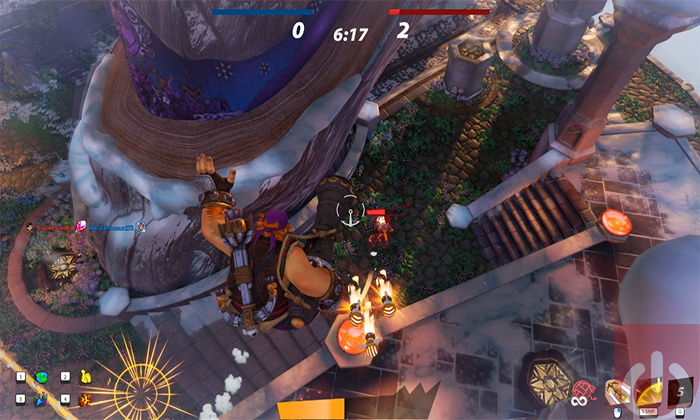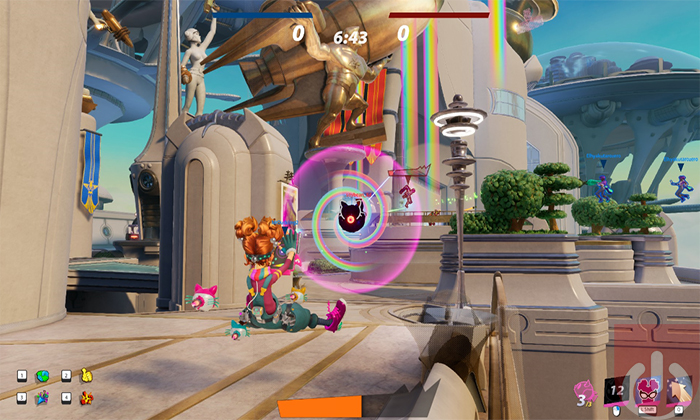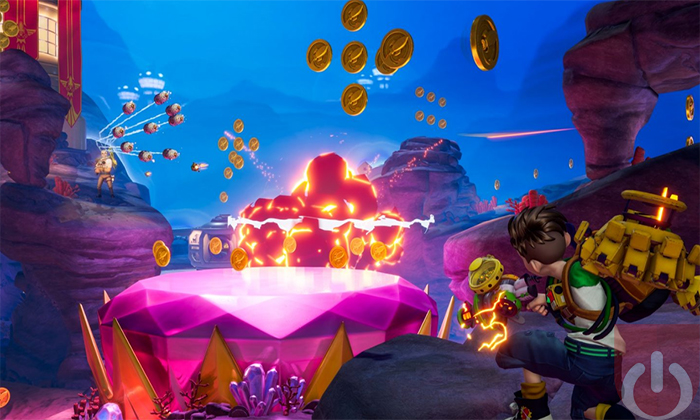Rocket Arena
Rocket Arena is in an interesting spot. As a uniquely-styled hero shooter, it has the chops to stand alongside the juggernauts of the genre. The basic gameplay is fun. It offers a nice twist on arena-based combat. And like Fortnite, it’s suitable for all ages. Success is almost guaranteed. Unfortunately, there are some sticking points that could lead to it’s undoing.
“Smash Bros. meets Quake” has been thrown around a lot lately. Anyone who’s played Rocket Arena would probably agree with the sentiment; while it’s not the most accurate description of this hero shooter, it does drive home the game’s vibe. All of Rocket Arena’s heroes are packing rockets. The combat is fast paced and explosive but there are no fatalities. Instead, players are sent flying towards the edge of the arena with each attack. Get hit enough times and it’s “KO” – a player blasts through the arena barrier, only to float back down seconds later.
Rocket Arena is similar to Sky Noon. The focus for both is to push players around while trying to complete different objectives. That said, Final Strike Games’ shooter is a slightly different beast. This is mainly due to how Rocket Arena better incorporates the Smash Bros. elements – like the damage bar that signifies of far a player is thrown after being hit, dynamic maps that feature environmental hazards, and so on – in order to make a truly standout experience.
By that, I mean Rocket Arena doesn’t play like other 3rd person shooters. Some things are familiar, sure. But the adherence to an explosive arsenal keeps things interesting early on. There isn’t much splash damage, sans a few special attacks and power ups, so players will need to land their shots. This requires a decent understanding of a character’s weapon and how their projectiles differ. Some rockets are lobbed. Others fly at an angle, homing ever so slightly. Quick firing launchers with short reload times vs. slower shooting weapons with infinite ammo. Essentially, there’s a bit of strategy at play here.
Being strategic also applies to movement. Boost ramps, triple jumping, a dedicated dodge button (to stop yourself from being juggled by multiple rockets) and more can be utilized at a moment’s notice. Rocket jumping is easy here. You can’t kill yourself with your own bombs and such. This mechanic is pushed further still, allowing players to rocket jump up the side of a pillar or back onto a platform by firing at a downward angle; your explosions tend to push you upward as opposed to away from a given structure. The focus on mobility is a good thing, considering how easy it is to be KO’d after a few well-placed shots.
Matches can be frantic. Part of the fun comes from the chaotic nature of things. That’s the Smash appeal – a well thought out plan can quickly go sideways when you’re blindsided by a giant bomb. Players who are able to adapt on the go will be the most successful. Still, even if you’re being KO’d left and right, Rocket Arena can still be entertaining.
The varied match types help in this regard. Most of them are recognizable. Rocketball, Mega Rocket, Knockout basically translates to Gridiron/CTF, Control, and Team Deathmatch. Treasure Hunt stands out a bit, with the goal switching from playing keep away with a treasure chest to racing for scattered coins and back again. Familiar or not, they all tend to be fun in their own right; the 3v3 bouts usually come down to the wire, with one team edging the other.
Rocket Arena is capable of providing hours of explosive fun. And while the modes of play are familiar, the way in which players compete isn’t. This is why it’s a game worth rooting for. The problem is that there are a few nagging issues that need to be addressed before it can live up to its potential. The first of which being Rocket Arena’s lackluster cast of characters.
It’s quite possible that I’ve been spoiled by games like Overwatch and Apex Legends. That my aversion to Rocket Arena’s heroes has more to do with my raised expectations than what’s presented in-game. Whatever the case, I believe that their character designs could have been better. There’s no personality or distinct bit of charm found anywhere. Just a vanilla cast – heroes that could’ve easily been swapped with similar archetypes found in several other character-based shooters.
Having a “meh” cast of characters doesn’t automatically spell doom. Their meh’ness does make it difficult to sell skins though. Regardless of how I feel about battle passes and such being in non-free-to-play games – I’m not a fan, FYI – I can at least understand the appeal that comes from getting an exclusive skin. And it’s not like you can’t unlock cosmetics through play. I just don’t feel incentivized to invest in Rocket Arena past its base price (even with receiving a review code). Not when I don’t particularly care for the available heroes.
Aside from the heroes themselves, I also have mixed feelings about their weapons. Yes, the adherence to an explosive arsenal keeps things interesting early on. My issue is that some of the heroes’ rockets don’t feel like rockets. Take Rev, for instance. This hero uses a rapid-fire rocket launcher that can send several projectiles at an opponent before needed to be reloaded. Because of this, her damage output is scaled back a bit to keep things fair; she has to hit players more than some of her counterparts to send them flying. This takes away from the game’s theme. Rev feels like she’s using a slower shooting chain gun/hitting people with bullets instead of rockets.
Aside from feeling weird to control, some of the characters suffer from balancing issues. Where each hero’s talents aren’t necessarily suited for every match types. Blastbeard, the pirate-themed character, is especially good at Mega Rocket. His shockwave ability not only destroys all incoming rockets, it also damages and pushes enemies away from him – a helpful skill when trying to hold a zone. Flux, on the other hand, is a solid choice for Knock Out. Even if she can’t land KO’s, her ability to go invisible could keep her from being knocked out/prevent the other team from scoring.
Of course, being good in one or two modes means that they might not the best for others. The good news is that this is a team game. The other two players can help bring home a win. That is, as long as they don’t drop out of a match. This is a problem that seems prevalent in ranked play. Where someone will rage quit the moment their team starts losing. There is a penalty but it isn’t time based; leaving hurts their rank but doesn’t prevent them from jumping into another match. A significant wait time could curve some of that.
Rocket Arena has a lot of potential. Its 3v3 matches are chaotic and fun. The violence is toned down, which could result in a larger player base. It even offers cross-play between PS4, Xbox One and PC – I’ve only experienced a few instances of lag and such despite being connected to various platforms. The lackluster cast, weird feeling weapons, and the propensity for players to drop out of matches (due to connection issues or the threat of a loss) keeps it from being great though. Here’s hoping that the “Smash meets Quake” vibe is enough to keep people invested.
Gameplay:
8
Rocket Arena is rather unique in design, resulting in exciting gameplay not found anywhere else.
Graphics:
7
The game looks ok. Its characters are left me wanting.
Sound:
7
The music, sound effects, etc. are decent.
Replay Value:
7
Rocket Arena is entertaining. Whether or not it can keep players from returning to free-to-play games like Fortnite or Apex Legends remains to be seen.
Final Score:
7.3




